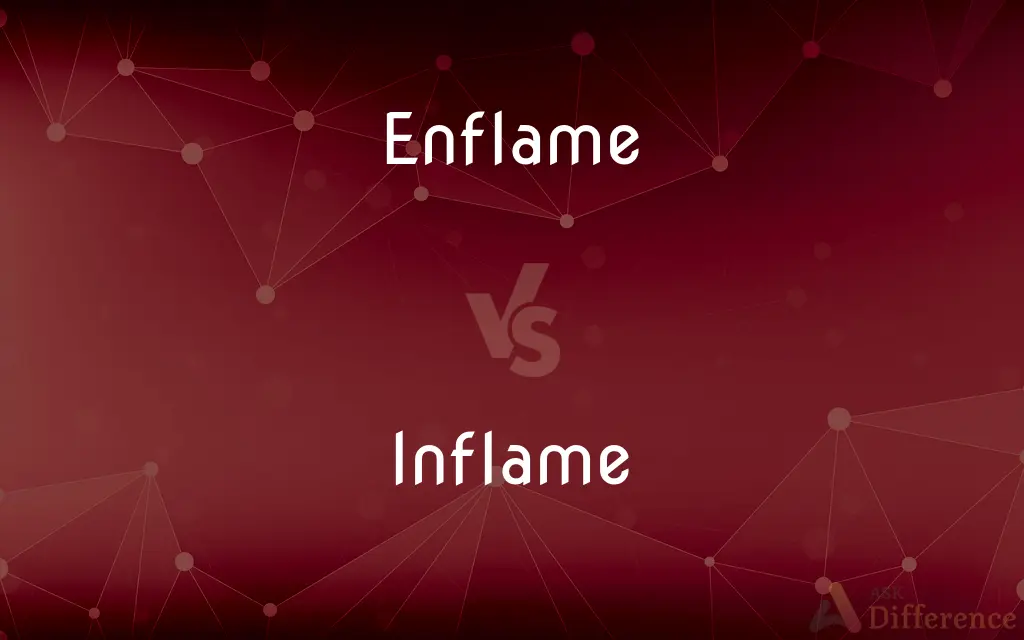Enflame vs. Inflame — What's the Difference?
Edited by Tayyaba Rehman — By Fiza Rafique — Updated on March 17, 2024
Enflame and inflame both mean to provoke or intensify strong feelings, but inflame is more commonly used, especially in medical or metaphorical contexts related to inciting emotions or physical inflammation.

Difference Between Enflame and Inflame
Table of Contents
ADVERTISEMENT
Key Differences
Enflame is a verb that conveys the action of setting something on fire or stirring up emotions, such as passion or anger. It's often used in a figurative sense, implying the intensification of feelings or situations. Whereas, inflame carries a similar meaning but is more widely utilized in both literal and figurative language. It not only refers to provoking strong emotions but also to causing a part of the body to become swollen and red, often due to infection or injury.
While enflame might be used to describe the act of arousing feelings or situations, inflame is more frequently seen in discussions ranging from emotional states to physical conditions, indicating its broader application. For example, inflammatory remarks can inflame a crowd, leading to unrest, or an allergen can inflame someone's airways, causing asthma symptoms to worsen. In contrast, enflame is less likely to be used in such medical contexts.
The choice between enflame and inflame often depends on the context and the writer's or speaker's preference for nuance. Enflame might be chosen for its slightly poetic or archaic tone, especially in literary or rhetorical contexts. On the other hand, inflame is more common in everyday language, medical discussions, and when a clear connection to physical or emotional agitation is intended.
Despite their similarities, the usage of enflame tends to be more limited and specific, often associated with literary or elevated language, whereas inflame's usage spans a wider range of contexts, from medical to conversational. This difference in usage highlights how each word fits into various narratives, with inflame being the more versatile choice for indicating provocation or irritation, whether physical or emotional.
While both enflame and inflame share the core concept of arousing or intensifying, inflame's broader application and usage in medical contexts make it the more commonly encountered term. Meanwhile, enflame offers a more nuanced or stylistic choice, particularly suitable for figurative or expressive contexts.
ADVERTISEMENT
Comparison Chart
Definition
To cause to burn; to arouse or excite feelings
To provoke or intensify feelings; to cause inflammation
Usage Context
More literary or figurative
Broad, including medical and conversational contexts
Commonality
Less common, with a slightly poetic or archaic tone
More commonly used, especially in medical contexts
Connotations
Often used to imply the intensification of emotions
Can imply provocation of emotions or physical reactions
Examples
The speech enflamed the audience's passion.
The allergen inflamed his airways.
Compare with Definitions
Enflame
To arouse or excite feelings.
The novel's tragic ending enflamed the reader's empathy.
Inflame
To cause to become angry or aroused.
The politician's comments inflamed public opinion.
Enflame
To cause to become inflamed in a figurative sense.
The unjust decision enflamed the community's anger.
Inflame
To intensify an emotion or situation.
The rumors inflamed the situation further.
Enflame
To provoke or intensify an emotional state.
The speech enflamed their desire for change.
Inflame
To cause inflammation in a medical context.
Certain foods can inflame gastrointestinal conditions.
Enflame
To ignite passion or enthusiasm.
The teacher's words enflamed the students' curiosity.
Inflame
To cause (a part of the body) to become swollen and painful.
Pollen can inflame asthma symptoms.
Enflame
To set on fire.
The sparks from the campfire enflamed the dry leaves.
Inflame
To provoke or excite to action.
The documentary inflamed a desire for social justice.
Enflame
Alternative spelling of inflame
Inflame
To arouse to passionate feeling or action
Crimes that inflamed the entire community.
Inflame
To make more violent; intensify
"inflamed to madness an already savage nature" (Robert Graves).
Inflame
To cause (the skin) to redden or grow hot, as from strong emotion or stimulants.
Inflame
To turn red or make glow
Great bonfires inflamed the night.
Inflame
To produce inflammation in (a tissue or organ).
Inflame
To set on fire; kindle.
Inflame
To become excited or aroused.
Inflame
To be affected by inflammation.
Inflame
To catch fire.
Inflame
(transitive) To set on fire; to kindle; to cause to burn, flame, or glow.
Inflame
To kindle or intensify (a feeling, as passion or appetite); to excite to an excessive or unnatural action or heat.
To inflame desire
Inflame
(transitive) To provoke (a person) to anger or rage; to exasperate; to irritate; to incense; to enrage.
Inflame
(transitive) To put in a state of inflammation; to produce morbid heat, congestion, or swelling, of.
To inflame the eyes by overwork
Inflame
To exaggerate; to enlarge upon.
Inflame
(intransitive) To grow morbidly hot, congested, or painful; to become angry or incensed.
Inflame
To set on fire; to kindle; to cause to burn, flame, or glow.
We should have made retreatBy light of the inflamed fleet.
Inflame
Fig.: To kindle or intensify, as passion or appetite; to excite to an excessive or unnatural action or heat; as, to inflame desire.
Though more, it seems,Inflamed with lust than rage.
But, O inflame and fire our hearts.
Inflame
To provoke to anger or rage; to exasperate; to irritate; to incense; to enrage.
It will inflame you; it will make you mad.
Inflame
To put in a state of inflammation; to produce morbid heat, congestion, or swelling, of; as, to inflame the eyes by overwork.
Inflame
To exaggerate; to enlarge upon.
A friend exaggerates a man's virtues, an enemy inflames his crimes.
Inflame
To grow morbidly hot, congested, or painful; to become angry or incensed.
Inflame
Cause inflammation in;
The repetitive motion inflamed her joint
Inflame
Catch fire;
The dried grass of the prairie kindled, spreading the flames for miles
Inflame
Cause to start burning;
The setting sun kindled the sky with oranges and reds
Inflame
Arouse or excite feelings and passions;
The ostentatious way of living of the rich ignites the hatred of the poor
The refugees' fate stirred up compassion around the world
Wake old feelings of hatred
Inflame
Become inflamed; get sore;
His throat inflamed
Common Curiosities
Can inflame be used to describe both emotional and physical reactions?
Yes, inflame is used to describe both the provocation of emotional states and physical reactions, including medical inflammation.
Is enflame always used figuratively?
While enflame can be used both literally and figuratively, it is more commonly used in a figurative sense to describe the intensification of emotions or situations.
Can inflame have a positive connotation?
While inflame often has negative connotations associated with irritation or worsening conditions, it can also have positive connotations in contexts where it means to arouse positive emotions or passions.
What role do enflame and inflame play in language?
Both enflame and inflame enrich language by providing nuanced ways to describe the provocation or intensification of emotions, situations, and physical states.
Why might someone choose to use enflame over inflame?
Someone might choose enflame for its poetic or expressive qualities, especially in literary or elevated language contexts.
How does the concept of inflammation relate to inflame?
Inflammation is a physical condition characterized by swelling, redness, and pain, often as a reaction to injury or infection. Inflame refers to causing or exacerbating this physical condition as well as stirring up emotions or situations.
Can the use of enflame or inflame affect the tone of a piece of writing?
Yes, choosing between enflame and inflame can affect the tone of writing, with enflame potentially adding a more poetic or dramatic quality and inflame being more straightforward or clinical.
How does usage of enflame and inflame differ in medical vs. literary contexts?
In medical contexts, inflame is commonly used to describe physical conditions of swelling and irritation. In literary contexts, enflame is more likely to be used for its figurative sense of arousing emotions or passion.
Is it important to know the difference between enflame and inflame?
Understanding the difference is important for precise communication, especially in contexts where the specific connotations of provocation, arousal, or physical inflammation are relevant.
Are enflame and inflame interchangeable in all contexts?
Although enflame and inflame share similar meanings, they are not always interchangeable due to their different connotations and the contexts in which they are typically used.
Share Your Discovery

Previous Comparison
Heathen vs. Paganism
Next Comparison
Fence vs. WallAuthor Spotlight
Written by
Fiza RafiqueFiza Rafique is a skilled content writer at AskDifference.com, where she meticulously refines and enhances written pieces. Drawing from her vast editorial expertise, Fiza ensures clarity, accuracy, and precision in every article. Passionate about language, she continually seeks to elevate the quality of content for readers worldwide.
Edited by
Tayyaba RehmanTayyaba Rehman is a distinguished writer, currently serving as a primary contributor to askdifference.com. As a researcher in semantics and etymology, Tayyaba's passion for the complexity of languages and their distinctions has found a perfect home on the platform. Tayyaba delves into the intricacies of language, distinguishing between commonly confused words and phrases, thereby providing clarity for readers worldwide.















































